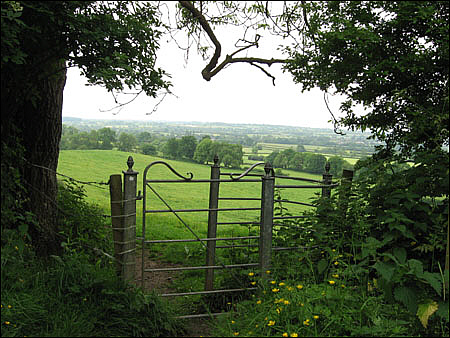
When we set off to walk the Cotswold Way recently, we were exploring new territory in a type of countryside that was unfamiliar to us. Here are a few jottings, but this post owes far more to the photographs taken by my wife than to my words.
Our lives have been spent mainly in the Highlands of Scotland and North Wales, although I was brought up in West Sussex at a time when that still beautiful county was truly rural, rather than a dormitory for London and other urban areas. So you could say that our natural habitat is the mountains and moorlands that are typical of Britain’s Celtic fringes, and we have walked thousands of miles in such areas, both at home and when we travel abroad.
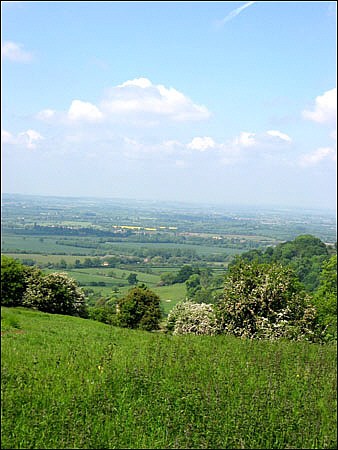
The Cotswolds could hardly be more different; perhaps the quintessence of the English lowland landscape, entirely free of the rawness that is so characteristic of upland areas where the violent hand of erosion is apparent wherever one turns. During the nine days that it took us to cover the hundred odd miles from Chipping Camden to Bath, we saw this spectacular part of the world in perfect late spring weather, with the May Blossom still at it’s best, new leaves fresh and green on the trees after a hard winter, and wild flowers everywhere.
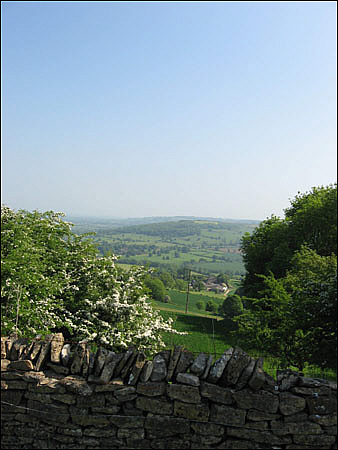
This is a landscape that, since it’s bare frame was sculpted by nature at the end of the last ice age, has been clothed by man, and what glorious attire several thousand years of ruthless exploitation has created. I have used the word ‘exploitation’ carefully here, for in considering such places that are now treasured for their beauty and tranquillity it is essential to remember that aesthetics played no part in the way they came into being. This is a landscape that predates any concern about ‘the environment’, tourism, or recreation, and although such areas are often spoken of in terms of natural beauty, this is misguided too. The hand of man is everywhere, in the neat fields separated by hedges that exist only because they are necessary for agriculture, in the well tended woodlands, in the floras that have been allowed to thrive because they are beneficial – or at least harmless – and the absence of those flora that are not.
The Cotswolds provide rich well-drained soils on their lower slopes combined, in the past, with areas of open grazing on the higher ground, ideal for sheep. Much of the uplands now grows crops too, although sheep are to be seen here and there in pastures and where areas of common land have survived.
During ages when agriculture had only two essential purposes – the provision of food and the means of making clothes – such productive land has been highly prized. This has been the case in the Cotswolds for at least 5000 years. The landscape owes its character to countless generations of farmers who were all too aware that only successful cultivation could protect them from destitution and starvation. In our time, when food and raw materials can be sourced from any part of the world, all that has changed.
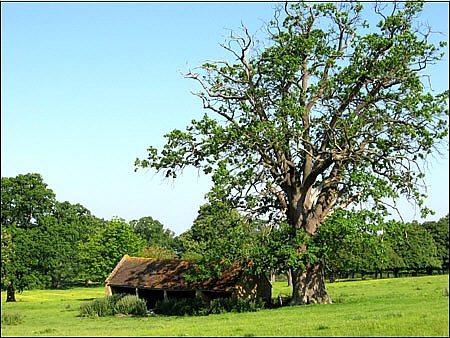
Only in the 17th and 18th centuries did large landowners begin to make attempts to beautify the areas around their mansions by creating parks; idealised landscapes set out by the likes of Capability Brown where agriculture took second place. But although these are a joy as one walks through them, with their vast trees set in undulating grassland providing ever-changing vistas, they are a very small part of the whole.
The Cotswold Way follows the tops of the wolds* wherever possible, but with excursions down to the edges of the broad vales of Evesham and Gloucester. It is tempting to say that these rather tame uplands are mere molehills compared to the kind of country we are used to walking in, but although this is true it belies the vast panoramas that they provide, particularly in the early stages of the journey. The outlook to the northwest over an untroubled rural landscape seems almost limitless, and one gazes at it in endless fascination and wonders that so much rural beauty can have been preserved in a heavily industrialised nation.
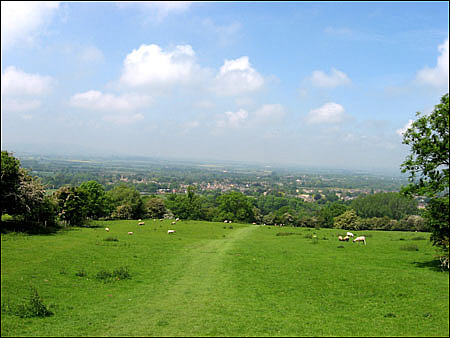
From the heights around Broadway Tower the eye scans thirty miles across the Vale of Evesham to the blue outline of the Malvern Hills beyond Worcester, and in clear weather onwards to the Welsh Marches, and even the rugged mountains far across the border in Wales. No one who has witnessed these panoramas can be in any doubt that much of our landscape is still rural, even if the population is not. Nor can one fail to marvel at such beauty existing in an age when most people live in urban or suburban areas. But for how much longer will this continue to be the case?
Along the Way, we stayed in pubs and Bed and Breakfasts, our only real interest after the day’s walking being some beer, food, a good book, and finally a glimpse of the television weather forecast to reassure us that the fine weather would continue. One evening I caught the regional news while waiting for the forecast and heard that protest groups were trying to stop one of the major energy companies installing wind measurement towers in the Vale of Evesham in preparation for planning applications to build wind farms. This was the very landscape that we had been so entranced by for the previous couple of days. After the first recoil at the thought that such desecration of a place of great beauty could even be contemplated, my thoughts turned to the Malvern Hills, an ever present distant blue line as we trudged along, which overlook the Vale of Evesham from the north-west, and I thought, not for the first time, about their association with Edward Elgar.
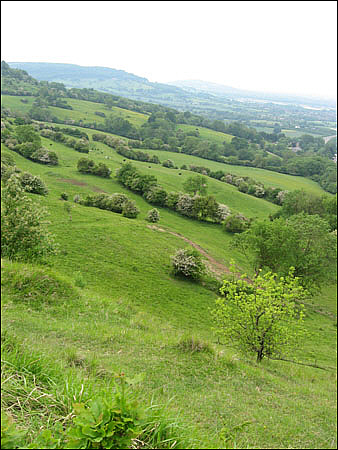
As a child and young man, this most English of composers lived just outside Worcester on the edge of the Malvern Hills. Although he is best remembered for the rousing, but now unfashionably, Pomp and Circumstance March No1 with its chauvinistic finale, Land of Hope and Glory, this is quite untypical of the main body of his work. Elgar was, above all, a pastoral composer, and his deep love of the Worcestershire countryside and the Malvern Hills, countryside that he loved and knew so well, imbues just about everything else he wrote. He was a great walker and cyclist throughout his life and never more content than when free to roam the byways, lanes, and paths of his native county. To put it in the usual trite terms, it was from this that he drew his inspiration.
It is impossible to fully appreciate Elgar’s violin or cello concertos, the first symphony, or countless other lesser works without recognising the extent to which the wonders of this beautiful landscape contributed to his creative life. Its importance to him is well illustrated by an incident shortly before he died.
During Elgar’s last illness, an old friend from his youth in Worcestershire visited him. As the man was leaving, Elgar called him back to his bedside and said, ‘After I am gone, if one day you are walking in the Malvern Hills on a beautiful summer morning, and hear someone in the distance whistling this tune’, and he quietly whistled the opening theme from his cello concerto, ‘don’t be surprised, it will only be me.’ It would seem that Elgar, a devout catholic, made little distinction between the magnificence of Heaven and the Malvern Hills.
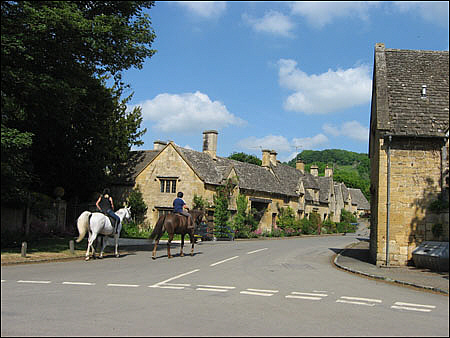
The association between unspoiled countryside and the creative process is so ingrained in our culture that it needs no explanation. By industrialising such landscapes with wind turbines, we do far more than just commit acts of pointless vandalism. We stifle the ability of future generations to see their surroundings in terms that are not entirely anthropocentric. Although the Cotswold landscapes are breathtakingly beautiful, that beauty is not derived form nature alone, nor entirely from the works of man, but from a unity of the two that is enduring, glorious, and reassuring.
It would seem that we are already breeding generations who think that it does not matter if such resources are impaired. I recently heard a spokesperson for the British Wind Energy Association say in an interview that people would get used to the fact that the countryside ‘will change slightly’ as more and more wind farms are built. This is no slight change, it is a radical alteration in out relationship with our surroundings. It is not just the visual impact that wind turbines can have in places like the Vale of Evesham. This is troubling enough, but the change in our psyche that that allows them to be built is far more so. For many years it has been understood that certain landscapes are immensely valuable assets that should be preserved because they are irreplaceable. Now this thinking seems to have been discarded without any consideration of the consequences.
WG Hoskins says in the introduction to the 1974 edition of his incomparable Making of the English Landscape:
Many parts of the English landscape remain just as our forefathers left them a long time ago. It is to these quiet solitudes … that we can still gratefully turn for refreshment and sanctuary from noise and meaningless movement.
As noise and meaningless movement becomes an ever-larger part of most people’s lives, so the preservation of the countryside in places like the Cotswolds and the Vale of Evesham becomes ever more important. We would not stand by and watch our great gothic cathedrals, or the ancient castles that still remain, modernised and put to new industrial uses, so why are we so complacent about what is happening to the remaining examples of unspoiled countryside that are equally part of our heritage and culture?
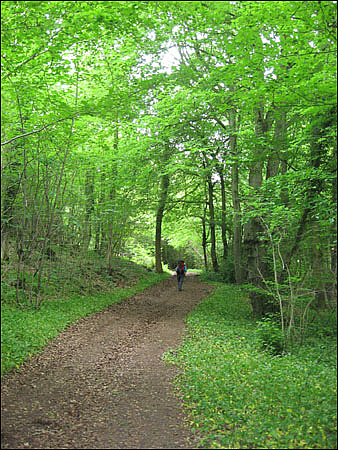
Perhaps the greatest hope for the Cotswolds lies with the people who live there. All the locals that we stopped to talk to along the way, and there were many, seemed immensely proud of their beautiful landscape, and glad that people like us were coming to enjoy it in the best possible way; on foot following the winding paths through the woods and fields. A surprising number of them seemed to have walked the Cotswold Way themselves, and the impression I got was that they will be unlikely to let anyone despoil their heritage without a fight.
* A piece of high, open uncultivated land or moor.

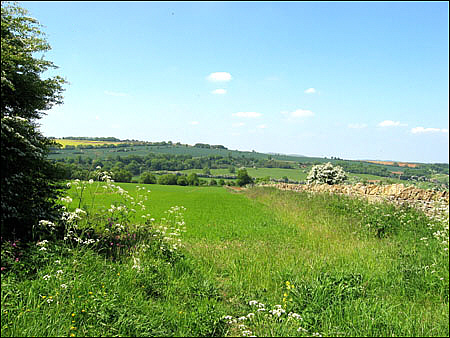
TonyN, just to say very nice article and photos; being an urbanite, it is very pleasant to spend a day or so out of town in places like this and escape from the noise and bustle for a while… Re the “quiet solitudes”, your WG Hoskins quote is spot on.
TonyN
You saw my note on the wind power thread and indeed we had a long discussion on the subject on the Chill thread.
I lived close to the Cotswolds for many years-it is a most beautiful area, very different in nature to either Devon where I live or North Wales, but it is very bucolic as your very nice article demonstrates.
My great fear is that in the great rush for over priced inefficient wind power we will not only cover our finest countryside in windmills (mostly uplands) but then will have to put in ugly transmission lines to get it to where it is needed. This will ruin the British countryside as we know it.
(Wind power off shore I have no problem with).
If you fancy another lovely ‘lowland’ walk can I suggest the Ridgeway in Berks/Oxon/Bucks.
Tonyb
Alex and Tony:
I must give the impression sometimes that I am making digs at urbanites, and that is in no way the case.
According to the Royal Commission on Urban Pollution, four-fifths of the UK population now live in urban areas. It is not, therefore, surprising that people who live in rural areas feel they are outnumbered and vulnerable to having their surroundings influenced by people who have priorities very different from their own. For those who live in towns visiting the countryside is optional; for those who live in rural areas it is not.
I found it reassuring that both the Sunday Times and the Sunday Telegraph carried articles this week that were critical of the impact of wind farms, and also the massive infrastructure in the form of power lines that is required to service them on the landscape. In the case of the Sunday Times this included an editorial pointing out that the energy industry is awash with profits and it is reasonable to expect that at least some of the grid should be underground, at greater expense, to prevent the degradation of unspoiled landscapes.
So far as offshore wind is concerned, I am at a loss to know how anyone can make a case for this. Power is generated in a hostile environment even more remotely from where it is consumed, costs are higher, visual impact is still a problem, there are the same requirements for backup to cope with intermittency, and the dependence on subsidy is even greater.
TonyN,
The photos are marvelous. I must admit the English countryside is hard to match for attractiveness. Maybe parts of Ireland and France comes close.
Maintaining the environment is what ‘environmentalism’ should be about of course – and you should appreciate that this is a dirty word to many Right wing types, who are usually AGW contrarians, who are of the opinion that capitalism should be allowed a totally free rein and who think that any sentimentality than might, for instance, lead to the natural environment being given preference to the construction of a new motorway is quite reactionary.
Obviously, you are not one of them; and you are right about wind energy, which probably does have its place, but the best that can ever be expected is to produce 20% of electricity supplies this way. So that raises the question of what about the other 80%? Why so much discussion about a minor form of energy generation when the question of how the majority of energy is created is ignored?
The public are being presented with a false choice. It is not Wind vs Fossil fuels, or even Solar vs Fossil fuels, or even the sum of every so called ‘green’ source of power imaginable vs Fossil fuels. That is just not realistic.
For reasons already stated, I cannot see any alternative to nuclear power and, generally speaking, I would like to see the environmental movement argue along the lines of the French group ENF
http://www.ecolo.org/
And, that would be a much more sensible argument, than the one you’ve used so far, in fighting for the protection of the English countryside too.
Nice Post Tony. I live in the Cotswolds Nr Stroud and it is indeed a beautiful place (although Stroud itself is not the best example of a Cotswold town). I would venture that it reminds me more of back home in NZ than it does anywhere else, the big difference occurring in the winter with NZ not having so many deciduous trees, but the summer landscapes are similar in places.
Did you go anywhere near Stroud? If you did you would have seen the solitary wind turbine in Nympsfield, just to the South West of Stroud. This is the contraption the new Tory MP in Stroud told me produces power when ever the blades turn irrespective of the wind speed. Ummmm the blades have been still quite a few times recently, I just wonder how efficient it really is.
PeterM there was a recent calculation done for the UK on how many turbines we would need to achieve the Government targets. It was based on what turbines have actually managed to produce in the UK rather than installed capacity, and the upshot was we don’t have enough land (or ocean). Many wind farms are not even achieving 15% and our biggest in Scotland was below 10% I believe. Many technical issues and challenges are being ignored by our representatives, the operators are suffering many reliability issues, and I wouldn’t bet against some of the existing turbines being shutdown and abandon within 5 years. The challenges for the offshore turbines are even greater and I doubt they will be built. The operators will discover eventually that the running costs outstrip the returns.
Whilst the debate in the UK has mostly focused on the destruction of our countryside from an aesthetic point of view, I think it will now start to focus on the economics. In many ways this is easier to win, as it will avoid all the old augments about “not in back yard” and the stupid notion held by some in the cities that everyone living in the country is rich.
And I feel the people are catching on to the hypocrisy of the green movement that on the one hand seeks to ban everything and anything that may harm any animal or plant, but is willing to forgo all of these principles in the name of Climate Change.
Peter M:
Those remarks would be much better addressed to Chris Huhne, although he may be rather preoccupied with private matters at present.
So far as wind farms being a disgusting capitalist plot is concerned, it is worth bearing in mind that pre-1997 the conservatives did no more than initiate schemes to examine whether this kind of generation was viable. We have thirteen years of labour rule to thank for all the turbines that now litter the landscape. During that time EU targets have become entrenched and made it very difficult for policy makers to dump wind, whatever they may think about it.
It would be interesting to know why you think that the British countryside is worth preserving.
Peter G:
I wish that I had known that you were so close to Stroud as we spent a night at the Clothiers Arms there, and yes I did see the Nympsfield turbine: stationary! It was the only time we did see one, but in the hot weather we looked forward to the times when we were right on the summits of the Wolds where there was a cool breeze. I wonder what the future holds.
The economics of wind, as you say, are a mess and I am certain that as the economic crisis deepens the focus will shift to this problem. We are all likely to become very cost concious over the next few years, but the EU targets for renewables remain and unless Germany starts looking more objectively at it’s energy costs, and consequent loss of competitiveness, then there seems little hope of action.
TonyN,
It’s natural to be most concerned about the area close to where you live and it’s easy to be a local ‘environmentalist’ when its your ‘backyard’ is threatened. However, other areas are equally important. Maybe you should have your next walking holiday somewhere like the Niger Delta and show us some photos of what is going on there too!
I didn’t, and wouldn’t, describe wind farms as a “disgusting capitalist plot.” But I would say it is more a case of politicians, from all main political parties, having to be seen to do something and then putting a tick in the right box. It’s a way of avoiding the real issue. Whether you agree with me, or not, on climate change it seems to me that your best line of attack on the wind turbine issue is to keep reminding them of that.
I agree with Peter about the need for nuclear as part of a more balanced energy programme but it-and other ‘conventional’ fuels-will need to be the mainstay for many years to come as renewables just won’t do the job.
Unfortunately onshore wind power is a side show and one that is hugely damaging to the countryside that is so precious to Britons as we are such a small country.
Ironically after my last post commenting on the need for pylons to distribute the power (theoreticaly) created by turbines, there was an article describing where some of these will go. Once again they will desecrate some of our finest landscapes. To me you don’t save the environment by trashing the countryside.
To make matters worse, this highly inefficient method of power generation is hugely subsidised. At present this is ‘lost’ in our bills-being about an average of £100 per consumer. As the proportion of wind power rises this amount is set to increase very considerably and will become a significant and noticeable part of our bills.
As I have said here before wave/tide technology is way behind wind and solar largely impractical, so there will be no input from those sources.
I can’t see how we can prevent ‘brown outs’ as ironically our electric usage will rise by 50% over the next twenty years (electric cars etc) even taking into account greater efficiency of use. As we haven’t put in place the means to generate the power needed, and have a legal obligation to reduce carbon no matter how expensive or damaging that may be to our environment, the future means more ugly wind farms, even uglier transmission lines, huge subsidies and STILL we won’t have enough power for our needs!
Not exactly a rosy picture of the future.
Tonyb
Peter M and tonyb:
There is no need for me to report on what is happening in the Niger Delta, even if I could do so without flying, as there are endless news sources that are doing so already. And it is worth bearing in mind that it is within the power of the Nigerian government to regulate the process of oil extraction in their territory. The causes of the very real problems in that area lie in tribalism that makes efficient administration difficult and political corruption that makes it impossible.
It is worth remembering that climate alarmism was a politically risk free policy until last autumn. In view of tonyb’s pessimistic, and I would say perfectly reasonable, prognosis about the maladies of UK energy policy, for just how much longer will it be safe for politicians to tick the alternative energy box without thinking about what they are doing?
At the moment there are is an ever growing list of countries that have run into problems with emissions limitation legislation: USA, Australia, France, Italy (I think), Japan, and (Peter G should know) possibly New Zealand. What will national green energy initiatives that increase costs and reduce competitiveness look like if — or as many would say when — the Cancun climate summit fails in the autumn. If you toss a probably ‘very difficult’ IPCC plenary session in October into the mix then the political dynamics climate alarmism begin to look quite fascinating.
It will be very interesting to see what part the green industrial revolution plays in the UK emergency budget in a few hours time, and whether any provisions that are made will have substance or merely be greenwash applied as a sop to the junior component of the coalition.
TonyN said
“It is worth remembering that climate alarmism was a politically risk free policy until last autumn. In view of tonyb’s pessimistic, and I would say perfectly reasonable, prognosis about the maladies of UK energy policy, for just how much longer will it be safe for politicians to tick the alternative energy box without thinking about what they are doing?”
Of course the politicians HAVE to tick that box as they overwhelmingly voted a bill into law that compels us to cut our carbon emissions and that, together with EU guidelines, makes our present route pre-destined.
When consumers see the actual cost of renewables AND they have brown outs AND they see pylons marching across their favourite view, THEN they mnight wake up.
To go on a different route our politicians need to collectively recant their views as epitomised in the chlimate change bill. I suspect public opinion will force them to do that in due course, but I don’t see it as being a quick process unless people cotton on to the cost elements-and the fact that the UK could disappear and our carbon ‘ration’ would be taken up by other countries within 6 months.
tonyb
Perhaps those of us who listened to the emergency budget have just witnessed the first sign of politicians ‘waking up’, if not the public as tonyb suggests.
There were only two references to environmental matters that I noticed:
1) Establishment of a green bank, which has long been trailed, and no mention of what it’s resources will be. As I remember the original announcement the figure was a very small one.
2) Reconsideration of how the tax on flying may be applied.
Does anyone remember the days, quite recently, when all the talk was about recovery from recession led by the green industrial revolution? And I was at least expecting swingeing new ‘sin taxes’ aimed at reducing emissions.
Oh yes! and departmental budgets, other than those not ring-fenced, are to be reduced by 25% on average. DECC was not ring fenced and given the problems the country faces in maintaining a credible energy supply I wonder what will happen when their departmental spending is reviewed. Decisions will have to be taken between fulfilling its obligations as a department of energy which delivers, and fulfilling its obligations as a department of climate change. In other words do you focus on keeping the lights on, and industry supplied with abundant, low cost energy that allows it to be competitive, export and grow, or do you focus on reducing Co2 emissions whatever the cost? It would seem most unlikely that both are possible now.
I was also expecting a pretty comprehensive greenwash job motivated by political necessity, but not even that materialised. Is it just possible that the new administration has recognised that the tide of public opinion has turned, and instead of stealth taxes to change our behaviour and save the planet we are now witnessing some pots and pans being very stealthily moved to the back burner?
TonyN said;
“In other words do you focus on keeping the lights on, and industry supplied with abundant, low cost energy that allows it to be competitive, export and grow, or do you focus on reducing Co2 emissions whatever the cost? It would seem most unlikely that both are possible now.”
Logically the first but the two are incompastible. It takes an awful lot for politicians to climb down from their high horses-wee see it every day with the EU/Euro both of which are defended no matter the cost.
I fear Climate change will be the same. I suspect Cameron might like a year or two of cold weather so he can try to forget his over enthusiastic emdorsement. The most famous symbols of that being his husky trip and his bike riding with the car following behind.
A green job is an expensive job fuelled by public subsidy. I’m afraid those days of plenty are gone for some years and we need to be more hard headed.
tonyb
Further to #12 above, here is BusinessGreen’s take on the budget:
http://www.businessgreen.com/business-green/news/2265237/osborne-neglects-low-carbon
Straws are being clutched at and the greenest thing about the budget seem to be the grass that a few knotty problems are being kicked into.
All this area needs is 1000’s of government subsidized windmills that the governemnt can pay not to produce electricity
TonyN yes there are troubles in NZ for the green brigade. New Zealand has a number of well-known scientific sceptics, and I know from my contacts back there that lack of money is starting to get people to think.
One of the things that frustrates me, and demonstrates the frightening levels of ignorance of our politicians, is how they unerringly are able to choose the most inefficient way of doing things, energy production and use being a point. There is absolutely no way an electric car is efficient. In fact it is an appalling way to get around, with one exception. When our cities were clogged with un-burnt hydrocarbons, Carbon monoxide, various Nitrous oxides, and particulates there was a strong case for alternative fuels and or electric vehicles.
Electric vehicles shift the emissions from the point of use to a centralised out of area location. However it was not a win win situation as the transmission of electric power has always been a matter of compromise between cost and efficiency. So whilst there was a measurable target to reduce the harmful emissions in a confined area, a reduction in efficiency was acceptable.
However the battle of emissions has been won technically, and it’s only a matter of the lag as older vehicles are slowly replaced that prevents our cities from being as clean as they could be. Certainly from my personal point of view London as an example is much cleaner today than when I first visited in 1979. In fact my daily walk from Paddington to Marylebone along the A40 to work is not anymore something to be avoided.
With the emphasise now on CO2 reduction it beggars belief that electric vehicles and hybrids are punted around as if they produce no CO2. As anyone who actually thinks about it will realise, some electric cars will cost their users more CO2 than the equivalent petrol or diesel powered car. And the same is true for trains as well. But the economics have always been confused by taxation with road duty on petrol and diesel masking the inefficiencies of electric power for road vehicles.
However I’m getting a sense that this particular road crash is almost upon us and when a serious look at both capital costs and running cost are considered many of the current hair brained schemes will quietly be dropped. And it says a lot that the emergency budget today contained nothing for the AGW brigade.
Larry T:
Let’s hope that lack of government funds will concentrate minds.
Peter Geany,
You say ” As anyone who actually thinks about it will realise, some electric cars will cost their users more CO2 than the equivalent petrol or diesel powered car…. ”
I’m not sure if you have actually thought about it yourself but, as usual, you aren’t correct.
The simplest argument is put forward by Nissan on behalf of one of its electric cars:
it takes 7.5 kw to refine one gallon of gasoline – enough to drive a real EV about 30 miles without even using that gasoline.
Other benefits would be:
1)Any emissions are produced at the power station not in the city.
2)If nuclear or wind power were used there wouldn’t be any emissions.
3) Much of the power generated by coal fired power stations at night is either wasted or sold off very cheaply. This can be used to recharge EV batteries.
4) The western world would have to rely less on unstable parts of the world to secure its fuel supplies. The Saudi rulers are just as bad, if not worse, than was Saddam Hussein. We wouldn’t have to be quite so obsequious to them if we didn’t need their oil!
TonyN, re your #14, Caroline Lucas is much of the same opinion as the green campaigners and low-carbon business people mentioned in James Murray’s report, except that her rhetoric is somewhat more direct:
“…this budget was neither unavoidable nor fair. Instead it was a massively failed opportunity to shift the economy onto a fairer, greener pathway.”
Much of what she said could just as well have been said by Harriet Harman (e.g., Lucas: “They [the cuts] are not an economic inevitability – they are an ideological choice.” Harman: “[The budget was driven by] ideology not by economics.”)
I note one difference between them being that Harman is pro-nuclear and criticised the cancelling of the Sheffield Forgemasters loan, whereas Lucas is anti-nuclear and has been somewhat quiet on the subject.
Here’s more re Caroline Lucas and nuclear (Hansard from 27th May). How is she planning to power her Nissan Leaf, I wonder?
Alex:
As I see it, the budget leaves the greens in a position where, if they want environmental taxes and more expensive low emission generation of electricity with the considerable on-costs being passed straight to the consumers, then they will have to shout for them. At a time when all the talk is of cuts to welfare and public services, with swingeing tax increases, that will not be an enviable task. Those on-cost will, quite rightly, be seen as stealth taxes.
I’m not suggesting that this is an intentional strategy on the part of the coalition, but nevertheless that is the effect, and finding a way to gain any measure of public support will be very difficult for the climate activists now. In the course of s few weeks, they have gone from pushing at an open door to hammering on a closed one, and it will be interesting to see what new strategy they come up with. I would be very surprised if scare stories will work now, and there is a very real risk that, if they try such a campaign, it will push even more of the public and politicians into overt scepticism.
PeterM
I won’t say you are wrong, because some of what you say is correct and some is the same as what I said above. However as usual you are not in complete receipt of all the facts so let’s just look at it.
The one gallon of fuel will take my wife’s Fiat 500 (and many other similar makes) 80 miles on a run down the highway. Your 7.5 kw of electricity to produce the gallon of fuel will not have come directly from the grid but been produced from by-products of the refining process so its not a straightforward calculation. If the 7.5 kw had came from the grid there is a possibility that 10 to 15 kw was produced to ensure the end user gets their 7.5kw. This is why power stations are situated next to major users of power, or as in the case of aluminium plants they are built where cheep power (often hydro-electric) can be produced. Also you need to consider the energy used extracting the rare earth metals used in electric cars, and where these are located. It maybe a case of solve one problem and create another worse problem.
Your other benefits
1) I sort of agree, and this was once very important. Today in the west it no longer applies despite much false propaganda from the green brigade who often seem more anti car than concerned about pollution as a whole.
2) Correct again but we are years away from having all nuclear power (100 plus years at least) and will never have much wind power. Combine this with the need to raise taxes to replace the lost revenue from displaced hydrocarbon fuel and the overall price of electricity goes up for domestic users and industrial users alike destroying competitiveness. I think again when the proper thought processes get applied to this problem the solution will not be as we see it today.
3 Peter again correct, but batteries are not the only useful thing this power can be used for. We perhaps should focus on not producing power we don’t need. It can be done it is just political will and it’s not going to win votes or catch headlines.
4 Peter again I find little to disagree with here and having worked in Saudi in the 90’s I saw much I didn’t like, although this is not the place for me to go into my experiences, but suffice to say I was there when a massive bomb went off in Al Khobar in about May or June 1996, planted by our friend Osama. The West has a lot of its own oil, the US has estimated reserves 4 times what we know Saudi has and Canada 8 times. All the time we are discovering new oil and gas reserves, are finding new ways to extract the oil and gas, and are finding that old wells thought to be dry contain more oil than has previously been extracted. Also Coal can be turned into oil and gas. The ingenuity of our engineers must never be underestimated, but their efforts are often masked or destroyed by political market manipulation.
Something of the order of 98% of all oil prospecting has been done by just a few Western organisations; so much of the globe has not been covered. Also more and more evidence that oil and gas may not be “fossil” fuels is emerging. I am keeping an open mind but I have to say that the notion that Natural gas is all fossil looks unlikely.
All this casts doubt on peak oil. Perhaps in time we will view the disaster in the Gulf of Mexico as a blessing as it will undoubtedly lead to better and safer deepwater drilling, before we have too many of these rigs deployed. In the mean time we have to put-up with politicking at its worst as the US president finds out what it is like to be criticised from all sides and have no real answers.
Peter Geany,
The efficiency of an electrical motor is much higher than a petrol or diesel. The relative efficiencies being greater than 90% for electricity and something like 20% in ideal conditions for fossil fuels.
This is reflected in the running costs of the two options. Even in the USA, which has petrol at half the price of Europe, the running costs are are a factor of six less. OK maybe we just scale that down a touch to allow for manufacturers sales enthusiasm!
http://money.cnn.com/galleries/2008/autos/0809/gallery.gm_volt_reveal/index.html
You might be interested in this article too.
http://news.bbc.co.uk/2/hi/business/10138911.stm
True, EVs are never going to be as good as riding a bike in terms of CO2 emissions, but your claim that they are worse than fossil fueled powered vehicles is totally unsubstantiated and , as you put it, “beggars belief”.
Peter, don’t be taken in by media or manufacturers nonsense, or in the case of GM Obama administration nonsense on efficiency. If electric cars were so efficient we would be awash in them. That we are not tells a story.
A modern high speed diesel is about 45 to 50 % efficient, some of the larger truck engines achieving even better figures. Mechanical loses will be the same on both vehicles, but the part always ignored by these figures is the cost and loses during the transmission of the electricity.
Peter Geany,
You say “A modern high speed diesel is about 45 to 50 % efficient” Theoretically maybe, if was operating at its optimum RPM, but in practice you’d have to halve this for the performance of a typical road vehicle powered by diesel.
The disadvantage of the EV is not its efficiency or economy. What about range and battery technology? Don’t you think that might be a major factor? Your assertion that “If electric cars were so efficient we would be awash in them” just doesn’t follow at all if battery technology isn’t far enough advanced, which it hasn’t been, and probably still isn’t, but progress is being made.
http://en.wikipedia.org/wiki/Electric_vehicle_battery
But look, if you’re trying to make this sort of case, why don’t you back up your assertions with references? Do you have any?
But I suppose that’s expecting too much from climate contrarians. Never let the facts get in the way of prejudiced opinion!
PeterM (22)
That depends on what you call ‘running costs’, surely? Replacing the batteries every 5-6 years is not only a major expense, but represents an awful lot of CO2 and pollution. I wouldn’t be surprised if the overall lifetime impact of an electric car is pretty similar to a petrol or diesel one.